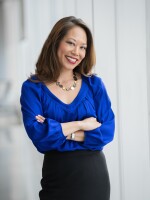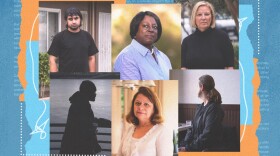Journalist Harriet Shawcross is fascinated by silence: why we speak, and why we don't.
She's traveled the world seeking answers to those questions, meeting earthquake survivors in Nepal, a silent order of nuns in Paris, a Buddhist retreat in Scotland. She's written a book about it, called Unspeakable: The Things We Cannot Say.
But it was her own silence that inspired this book. When she was a teenager, Shawcross stopped speaking at school for nearly a year. She could answer direct questions — she wasn't mute — but she wasn't able to engage in the kind of conversations that, she says, make us human.
"There would be days when you'd be standing near people in a conversation, and you'd think, 'I haven't said anything for a really long time,'" Shawcross says in an interview. "And you'd wonder if people that you were talking to were going to notice or say anything. And most of the time, they didn't, to be honest."
Interview Highlights
On her childhood episode
It was a very lonely time, and I think I was very ashamed of the fact that I wasn't talking normally. As a child, I'd never had any problems like this before.
And I mean, looking back, I guess it was more circumstantial. I was in a very prestigious all-girls boarding school. And then I say in the book my father was made redundant ... he was fired. My mom was very much, like, "Don't tell people about what's happening here. This is a kind of shameful thing that's happened" ... in the book I talk about taking a step back from the world. It was very much like a retreat. If you don't offer anything of yourself, you can't get hurt.
On selective mutism
In its simplest form, the way it's understood is as a phobia of speaking — so, the same way an arachnophobe would be if they were presented with a spider. And in the past it's been misunderstood, and people think that either they're being difficult, or that it's shyness. Selective mutism is very different to shyness, 'cause whereas a shy child might warm up the more they get to know people, with a child with selective mutism — often particularly in a school setting — the more they get to know people, the less likely they are to be able to speak. The silence gets more and more entrenched. ...
On visiting an intensive therapy camp for children with selective mutism, where they are taught how to conduct a conversation
Selective mutism is quite common in younger children, but it's more unusual for it to persist into the teenage years. And their children, at this stage, didn't have any friends — that was the kind of thing that came up a lot, with the parents. ...
You know, someone will ask a question, and how can you respond to that? You can respond with a question or a comment. And then what will you do? And it was this kind of breaking conversation down into its component parts. And what they were doing was so far from what a conversation should be. ... And for them, that's absolutely massive, 'cause it's the first time maybe in years that they've actually been able to just talk to a peer that they don't know, that isn't one of their family members.
On how her experience with silence has informed her career and adult life
So I work in TV, as a TV producer and a journalist, and many times, I've said, "Just pretend I'm not here. Talk to the camera. Don't look at me." And you'll know yourself, the art of an interview is in disappearing a little bit — in knowing when not to speak, in knowing how to use silence, and that it's often in silence that people reveal themselves. It felt very familiar to me — that slight disappearing act that I think, as a filmmaker, you often have to do. ...
Conversely — professionally, I think silence has served me very well — but personally, I don't think it necessarily has. That act of retreating back into silence — I very much held onto that as a survival strategy for a long time. And in terms of, particularly, romantic relationships with someone, I found it really hard to say what I felt or what I wanted. And in a way, that's one of the things that prompted me to write the book, was that I was getting married, and it was causing problems in our relationship. And my future wife was like: "You need to get to the bottom of this. Why do you find it so difficult to really say you what it is that you want or you need?" That's what started the journey of the book, and brought me back to that time where I was not expressing or saying what I needed to say at school.
Lauren Hodges and Jolie Myers produced and edited this interview for broadcast. Patrick Jarenwattananon adapted it for the Web.
Copyright 2023 NPR. To see more, visit https://www.npr.org. 9(MDAzMjM2NDYzMDEyMzc1Njk5NjAxNzY3OQ001))






